Recent Highlights
Objectives
Research themes
Training opportunities
How to apply
Investigators
Collaborators
Partners
Students
Seminars
Program management
Annual meetings
Contact us
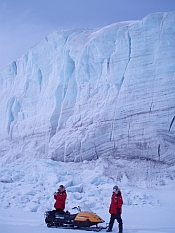
Contact information:
Ms Yella Jovich-Zahirovich
Project Coordinator
Tel. 514-398-7824
Fax. 514-398-7990
Dr. Lyle Whyte
Principal Investigator
Tel. 514-398-7889
Fax. 514-398-7990
Canadian Astrobiology Training Program
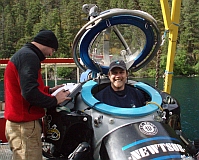
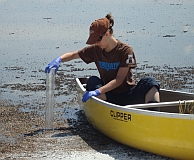
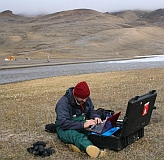
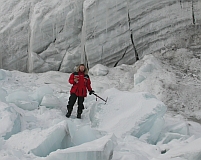
Training Opportunities
The goal of our program is to provide students with the broadest possible exposure to astrobiology and its applications to the industrial, public, and academic sectors. CATP Training will be accomplished through integrative research approaches containing elements of geology, chemistry, physics, astronomy, microbiology, and robotics, all of which will be implicated in constructing the program at the participating universities and institutions.
CATP will provide multidisciplinary and collaborative research training for the next generation of astrobiology HQP through development of professional research collaborations and through state-of-the-art training in highly successful research environments.
HQP will be exposed to an integrated research approach, combining fieldwork across Canada, including Mars analogue sites in Canada such as the high Arctic, and laboratory work at cutting edge analytical facilities at member Canadian universities, the CSA, Canadian industry (e.g. MDA Space Missions, MBP Communications) and our international collaborators (e.g. NASA Ames).
Development of professional skills is a key feature of CATP and required for effective collaboration and communication among diverse fields. The skills acquired by the trainees in a team environment will be directly transferable to any large collaborative endeavor, giving trainees the people skills and vocabulary to communicate across disciplines. Development of these skills will be reinforced and encouraged during our meetings and in targeted short courses and workshops developed by the McGill GPS and corresponding offices of the participating institutions.
Training opportunities are available for highly motivated individuals at the Postdoctoral Fellow (PDF), PhD, MSc, and Undergraduate levels as follows:
PhD, MSc Graduate Students
The graduate students recruited into the program will have the choice of several departments in which to register: at McGill, Natural Resource Sciences, Physics, Microbiology, Earth and Planetary Sciences, Geography, or Engineering; at Western: Earth Sciences, Physics and Astronomy, Geography, or Engineering; at U. Winnipeg – Bioscience, Technology, and Public Policy.
The MSc and PhD programs will consist of coursework, research, and field work according to the existing models in the host departments, with four innovative features provided by CATP: graduate option, interdisciplinary supervision, rotations, and videoconferencing.
Supervision. Each student will have a primary supervisor within his or her own university, with 1 or 2 co-supervisors from CATP Investigators or collaborators.
Rotations. Rotations will be a key innovative feature of CATP training and will be available and encouraged for all CATP students. These rotations will consist of 4-12 week internships in partner labs: either academic government or industrial sites (e.g. CSA, MDA Space Missions, MPB Communications, NASA Ames, Desert Research Institute (DRI)). Three tracks based upon field of study are available as follows:
- Analog Fieldwork track The primary targets for astrobiology investigations of other solar system bodies are Mars (in the short term) and Europa and Enceladus (in the mid- to long- term). Extremely cold temperatures characterize these targets, and, as such, the best terrestrial analogues are the Earth’s polar regions. Our opportunities for fieldwork are unique in the world. By leveraging support from the CSA CARN program, ongoing support from McGill, NSERC etc. we will be able to offer students access to some of Earth’s best analogue sites including the McGill High Arctic Research Station, the Haughton impact structure (Devon Island), Eureka (Ellesmere Island), a perennial hypersaline cold spring environment; St. Martin/Gypsumville, Manitoba, “Kidd Creek Mine, Ontario – a deep mine with the potential for understanding abiogenic versus biogenic sources of methane in the Earth's subsurface; and the Nuvvuagituq Greenstone Belt, Quebec – host of the world’s oldest rocks (4.3 billion years old). Fieldwork opportunities will also be available in collaboration with partner institutions such as NASA Ames (Antarctic dry valleys) and DRI (Mojave Desert).
- Wet Lab track This track will allow for interdisciplinary bio-geo-physico-chemical investigations of materials returned from analogue sites and for experimental and theoretical investigations of biosignatures across temporal and spatial scales. Students will visit two or more member institutions, thereby gaining access to relevant instrumentation and techniques available only at their host location.
- Instrumentation track This track is designed to train scientists and engineers in instrument design. Students will assist in the design and building of a field instrument or in the integration of an existing instrument onto an autonomous robot (e.g., a microscope onto a swimming robot). CATP trainees will work with engineers and scientists in order to formulate a robotic solution to a real scientific question. Several CATP investigators are involved in concept studies related to various exploration tools and methods, some funded by CSA and others in partnership with NASA and ESA
Graduate option. Graduate Options/Programs in Astrobiology will be implemented by 2010-2011 at McGill U. McMaster University, and UWO and will be available for PhD and MSc students.
Videoconferencing. A unique feature of our program that allows us to easily cross disciplines and promote further interdisciplinarity is our ability to hold virtual meetings and share seminars by videoconference. Presentations will be given by CATP Co-Is, collaborators, recruits, and invitees and will be videotaped and digitally archived for future viewing to build a strong library of lectures. As the program progresses, the feasibility of sharing established and new courses among institutions will be investigated.
Postdoctoral Fellows (PDFs)
Co-supervision, rotations, and videoconference sharing will be available as well as several additional features for these more senior trainees as follows:
Mentorship. PDFs will have the opportunity to supervise graduate research, including field and laboratory work.
Teaching. PDFs will be given the opportunity to lecture 2-4 times per term and will receive student feedback, a critical part of the teaching experience. They will gain valuable experience in preparing course proposals, curriculum development, and lecturing.
Conferences. Each PDF will be given a small budget ($2 K/year) for conference/workshop attendance
Undergraduate
Undergraduate student training will consist of NSERC USRA-type research positions, primarily from May 1 to August 31, in CATP member laboratories with the possibility for rotation into member labs and to participate in field research work at CATP analogue sites.